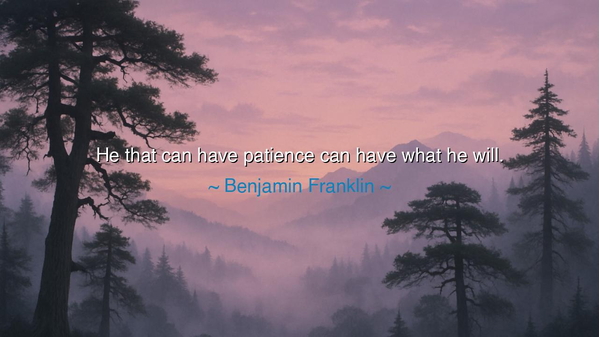
He that can have patience can have what he will.






Hear the immortal words of Benjamin Franklin, one of the great architects of a new nation, a man whose wisdom was as practical as it was profound. He declared: “He that can have patience can have what he will.” These words shine like a beacon across the centuries, teaching us that the key to attainment lies not in haste or fury, but in the quiet strength of endurance. For Franklin, who built his life from humble beginnings to the heights of statesmanship, patience was not weakness but power—the power to outlast obstacles and to seize destiny in due time.
The meaning of this saying is simple, yet deep: to possess patience is to hold dominion over oneself, and he who governs himself can endure long enough to reach any goal. Fortune may deny him for a time, enemies may resist him, trials may test him, but if he endures without surrender, the gates of opportunity will one day open. Patience is the steady hand that holds firm while the world shakes. It is the invisible strength that transforms dreams into realities by refusing to give up when others grow weary.
Franklin himself was proof of this wisdom. Born into a large and modest family, he began as a mere apprentice in a printing shop. Through years of slow labor, study, and steady self-discipline, he rose to become one of the most respected thinkers and leaders of his age. He did not rush to greatness, but walked there step by deliberate step. His inventions, his writings, his diplomacy—all were fruits of long cultivation, born from patience. Truly, Franklin’s life was a testimony that he who can endure time can in the end possess what he wills.
History offers many mirrors to this truth. Consider Abraham Lincoln, whose path to leadership was lined with failure and defeat. He lost elections, endured personal tragedies, and was often scorned. Yet he did not abandon his course. With patience, he persisted, and in time, when the nation was fractured, he became the very leader it needed most. His life teaches us that patience is not passive waiting, but the active perseverance that outlasts disappointment until the appointed hour arrives.
The origin of Franklin’s wisdom lies also in his understanding of human nature. Men often hunger for quick results, and when denied, they grow bitter and turn away. But Franklin saw that the great achievements—whether in science, politics, or life—belong not to the swift, but to the steadfast. The impatient man burns brightly and fades quickly; the patient man glows steadily, illuminating his path until he reaches the prize. This is why Franklin tied patience to mastery: to endure is to conquer.
The lesson, O seeker of truth, is to cultivate patience as the highest of virtues. When trials block your way, do not despair. When results delay, do not abandon the work. Trust that time, when combined with endurance, will bring forth harvests that haste can never yield. The impatient lose heart at the first resistance; the patient endure until resistance itself is broken.
Practical wisdom flows from this: set your goals with clarity, pursue them with effort, but bind your effort with patience. Do not let setbacks shake your spirit. Learn from Franklin—discipline yourself, endure with calmness, and let time be your ally, not your enemy. For time destroys the weak-willed but crowns the patient.
Thus engrave upon your soul: “He that can have patience can have what he will.” The treasures of life, the victories of history, the crowns of honor—they belong to those who endure. Be patient, therefore, in labor, in learning, in love, and in trials, for in patience lies power, and in power lies the fulfillment of all that you will.






AAdministratorAdministrator
Welcome, honored guests. Please leave a comment, we will respond soon